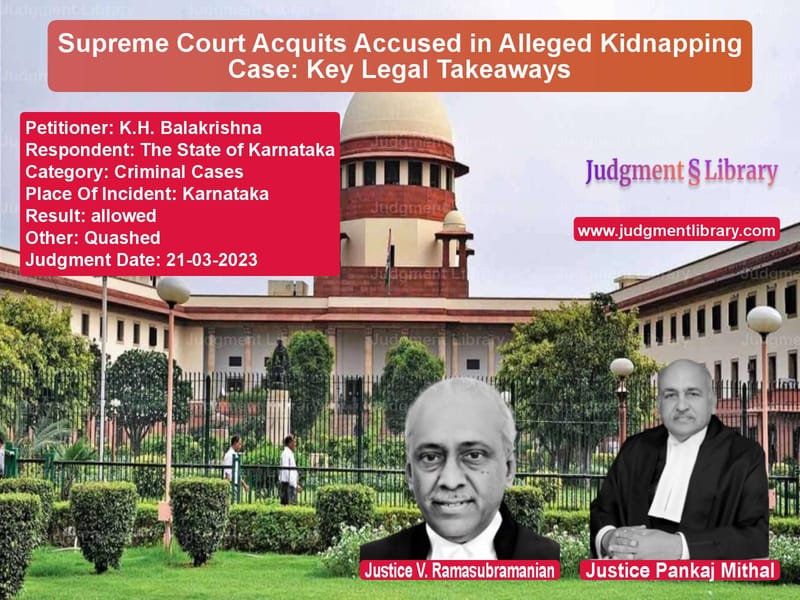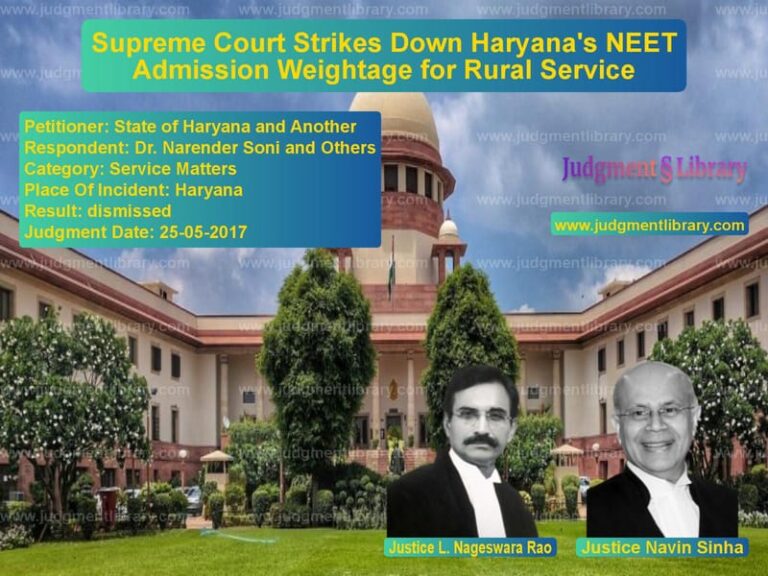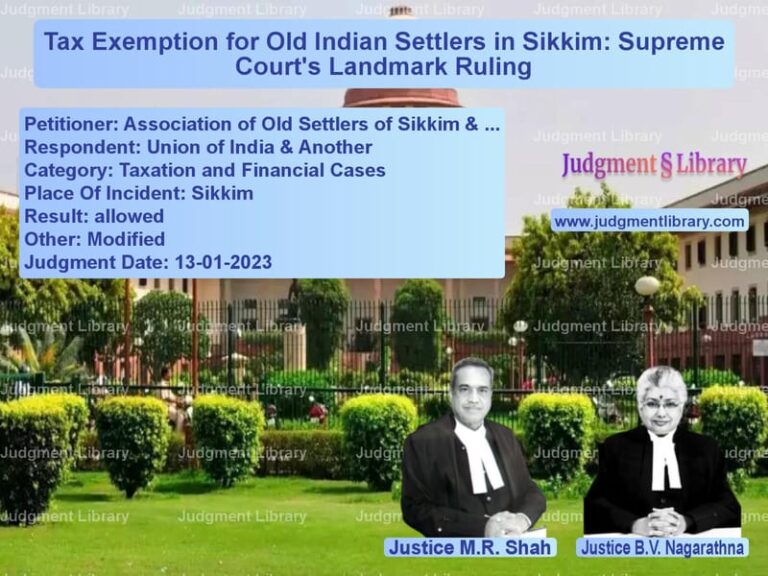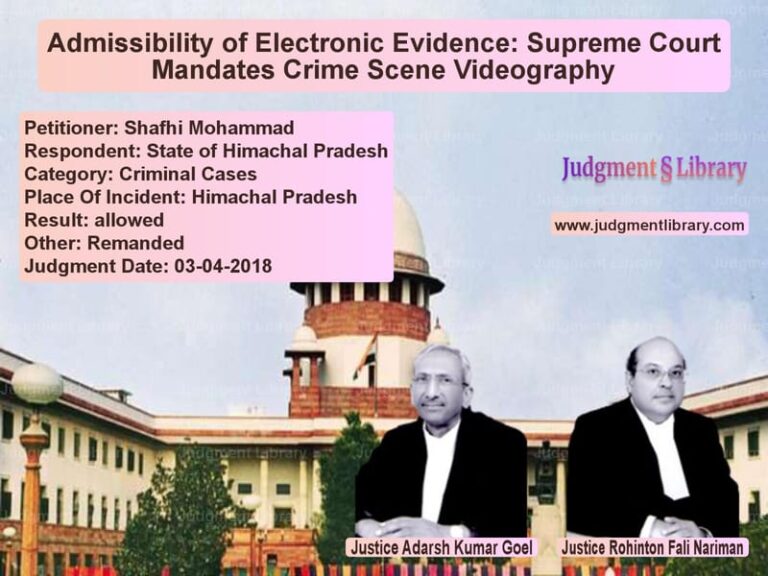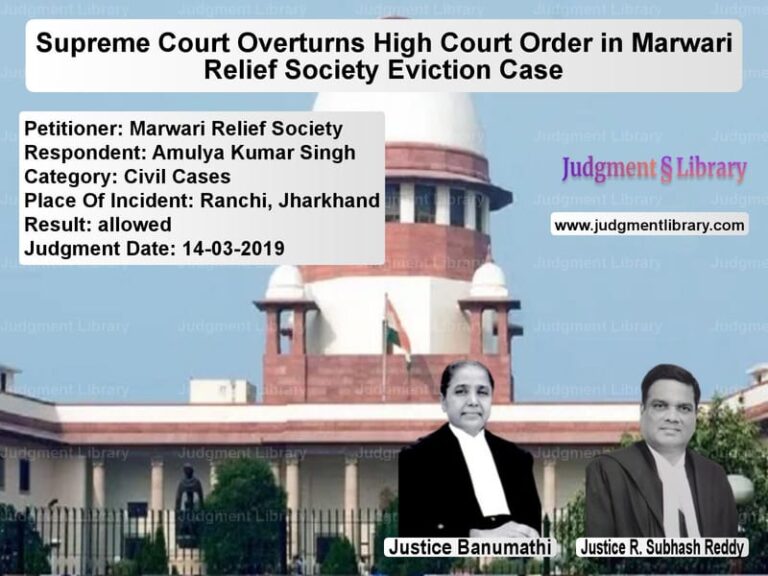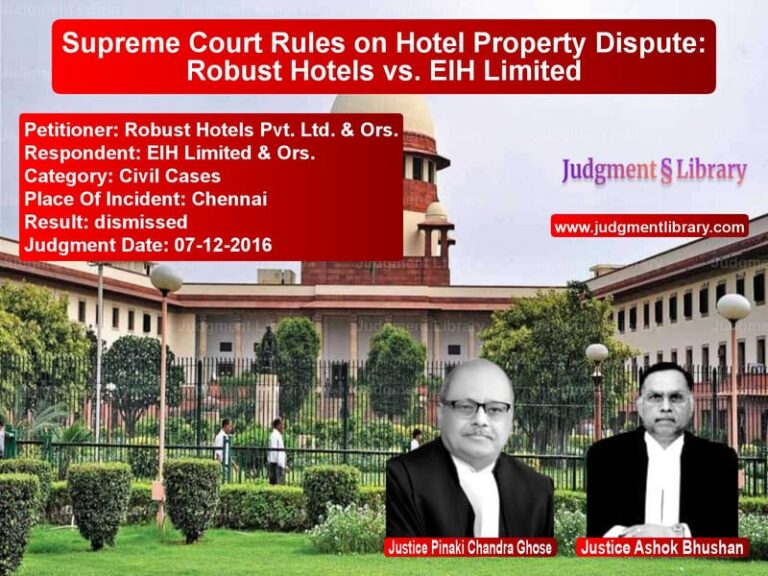Supreme Court Acquits Accused in Alleged Kidnapping Case: Key Legal Takeaways
The Supreme Court of India in the case of K.H. Balakrishna v. The State of Karnataka set aside the conviction of the accused under Sections 366, 342, and 506 of the Indian Penal Code (IPC). The Court held that the prosecution failed to prove beyond a reasonable doubt that the victim was forcibly kidnapped. The judgment underscores the principle that criminal conviction requires solid and credible evidence, especially in cases involving allegations of coercion and abduction.
Background of the Case
The case revolved around an alleged kidnapping that took place on October 25, 1996, when the complainant’s niece, Lakshmi (PW2), was reportedly abducted by the appellant, K.H. Balakrishna, while she was on her way to Kamala Nursing Home, Bangalore.
The prosecution’s case was that Balakrishna, along with his associates, forced Lakshmi into a car, made her unconscious using chloroform, and took her to various locations, including Bellary and Sholapur. Eventually, the accused allegedly forced Lakshmi to marry him at a temple in Sholapur against her will.
The appellant was convicted by the Fast Track Court-VI, Bangalore, in 2005, and the High Court upheld the conviction in 2010. The accused subsequently approached the Supreme Court, challenging both verdicts.
Arguments by the Parties
Arguments by the Appellant (K.H. Balakrishna)
- The accused and the alleged victim had known each other for several years before the incident, and there was a history of a marriage proposal between them.
- There was no medical evidence to prove that Lakshmi had been administered chloroform to render her unconscious.
- The victim had ample opportunities to escape or seek help but did not do so.
- She voluntarily traveled with the accused for nearly 20-23 days and never reported any force or coercion during this period.
- The marriage in Sholapur was performed in the presence of multiple witnesses, and there were no signs of resistance from the alleged victim.
Arguments by the Respondent (State of Karnataka)
- The victim’s statement confirmed that she was forcibly taken away and that the accused had threatened her family.
- The prosecution argued that since she was taken against her will and forced into marriage, the crime of kidnapping under Section 366 IPC was made out.
- Despite knowing that her marriage was already arranged with another person, the accused abducted her and confined her.
Supreme Court’s Key Observations
Unreliable Testimony of the Victim
The Court observed inconsistencies in Lakshmi’s testimony. She claimed to have been kidnapped but admitted during cross-examination that:
- She had known the accused since 1993.
- The accused had visited her home with a marriage proposal earlier.
- The accused never forced himself on her or misbehaved with her.
“The entire evidence on record in no way reflects that the appellant had any intention to kidnap the victim for the purpose of marriage. Their travel together and the manner in which the events unfolded suggest that she may have eloped voluntarily.”
No Evidence of Force or Coercion
The Supreme Court noted that Lakshmi was with the accused for almost three weeks but never attempted to escape or alert authorities. Even after marriage, she did not indicate that she was being held against her will.
“The absence of any resistance on her part, despite numerous opportunities, weakens the prosecution’s case of forcible abduction.”
Delay in Filing FIR
The complaint was lodged only after the victim called her uncle from Sholapur. The delay in reporting the alleged abduction raised doubts about the veracity of the claims.
Marriage Performed with Consent?
The Court noted that the marriage ceremony was attended by the accused’s family members and was even documented through photographs and video recordings.
“The smiling photographs of the victim in the wedding ceremony suggest that she was not under duress. If she was truly kidnapped and forced into marriage, such demeanor would be highly unlikely.”
Final Judgment
The Supreme Court ruled:
- The appellant’s conviction under Sections 366, 342, and 506 IPC was set aside.
- The judgment of the High Court and Trial Court was quashed.
- The appellant was acquitted of all charges.
- The bail bonds of the appellant were discharged.
Impact of the Judgment
- Strengthens the Standard of Proof: The ruling reaffirms that allegations of kidnapping must be supported by credible and consistent evidence.
- Prevents Misuse of Criminal Law: The judgment ensures that accusations of forced marriage and kidnapping are not misused to settle personal disputes.
- Emphasizes Personal Autonomy: The Court’s analysis recognizes that adult women have the agency to make their own choices, and criminal law should not be used to invalidate their decisions.
Conclusion
The Supreme Court’s judgment in K.H. Balakrishna v. The State of Karnataka highlights the importance of scrutinizing allegations of kidnapping and forced marriage carefully. The Court’s decision underscores the need for consistent, credible evidence before convicting an accused, ensuring that criminal law is not used as a tool for undue influence or family pressure. This case sets a strong precedent for future matters involving similar charges.
Petitioner Name: K.H. Balakrishna.Respondent Name: The State of Karnataka.Judgment By: Justice V. Ramasubramanian, Justice Pankaj Mithal.Place Of Incident: Karnataka.Judgment Date: 21-03-2023.
Don’t miss out on the full details! Download the complete judgment in PDF format below and gain valuable insights instantly!
Download Judgment: k.h.-balakrishna-vs-the-state-of-karnata-supreme-court-of-india-judgment-dated-21-03-2023.pdf
Directly Download Judgment: Directly download this Judgment
See all petitions in Bail and Anticipatory Bail
See all petitions in Attempt to Murder Cases
See all petitions in Extortion and Blackmail
See all petitions in Fraud and Forgery
See all petitions in Judgment by V. Ramasubramanian
See all petitions in Judgment by Pankaj Mithal
See all petitions in allowed
See all petitions in Quashed
See all petitions in supreme court of India judgments March 2023
See all petitions in 2023 judgments
See all posts in Criminal Cases Category
See all allowed petitions in Criminal Cases Category
See all Dismissed petitions in Criminal Cases Category
See all partially allowed petitions in Criminal Cases Category

